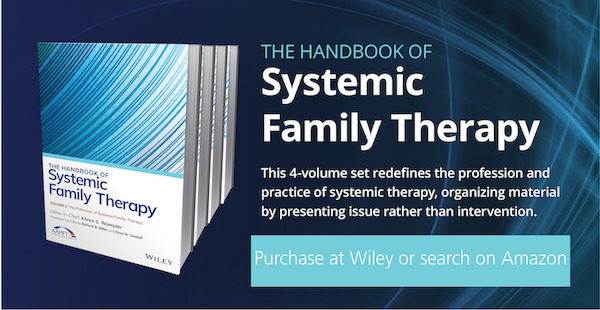
Family Therapists in Schools: Where We’ve Been and Where We’re Going
FEATURES
Autoimmune Neuropsychiatric Disorders in Children
This article provides an overview of Pediatric Acute-Onset Neuropsychiatric Syndrome (PANS) and Pediatric Autoimmune Neuropsychiatric Disorders Associated with Streptococcal Infections (PANDAS): A Beginner’s Guide for Mental Health Providers and Allied Professionals
Jerrod Brown, PhD, Jeremiah Schimp, PhD, Shelley Mydra, DMFT, Jenenne Valentino-Bottaro, PhD, Leanne Skehan, DCN, Bettye Sue Hennington, PhD, Kristy Donaldson, PhD, and Jennifer Sweeton, JD
When the Chart Is Watching Back: AI, Consent, and Control in Teletherapy Documentation
You finish a teletherapy session, rich with layered family dynamics, unspoken tensions, and a breakthrough moment in relational co-construction, and open the electronic health record to chart. But the platform has already been at work. An AI-generated summary sits there, neatly formatted, highlighting symptoms, diagnoses, and suggested next steps. It asks for your review, edits, approval; it even asks you to rate how well it did.
Ezra N. S. Lockhart, PhD
How Can MFTs Help Racially and Ethnically Minoritized Individuals Navigating Online Dating?
For many, dating apps represent hope and possibility. For racially and ethnically minoritized individuals, however, the experience is often more complicated. Despite the shift to digital dating, societal pressures and stereotypes remain prevalent.
Eman Tadros, PhD, Annemarie Sohn, MA, & Jixuan Zhao, MSW
Special To This Issue
Family Therapists in Schools: Where We’ve Been and Where We’re Going
In this article, we (a group of MFT colleagues, members of AAMFT’s Family Therapists in Schools Interest Network, along with school-based colleagues who have worked closely with us) will briefly review how family therapists got into schools, how they are thriving there, the multiplicity of job openings, and a little about what it is like to work in school settings. We hope to inspire more family therapists to explore this area of practice.
Anne Rambo, PhD, Jennifer Hodgson, PhD, Kathleen Laundy, PsyD, Michaelle Valbrun-Pope, MsED, Misty Schmidt, PhD, Nakisha Randolph, MA, & Sandi Cox, MA
Systemic World
Relief Under Fire: Chronic Repression and the Reorganization of Collective Survival
We are living through a historic inflection point, a moment that is reshaping how systems of power and resistance interact and how societies imagine their futures. Since 1979, Iranian society has been structured around an authoritarian system in which protest and suppression form a recurring relational pattern. Long-standing geopolitical conflict has shifted from indirect confrontation to direct military strikes inside Iran’s borders. For many Iranians, this does not feel like a sudden beginning but the escalation of a conflict that has been structuring life for decades.
Bahareh Sahebi, PsyD
AAMFT News
- NEW! 2025 Workforce Study
- Gender Affirming Care Guidelines
- Register now for the 2026 Leadership Symposium in Atlanta!
- Online Therapy Guidelines
- Access MFTs: Licensure Portability
Departments
A Message From the President
The Role of MFTs in Uncertain Political Times: Two Families as an Example
No matter what side of the political spectrum you find yourself, I think all will agree that the past year has been a roller coaster ride in United States (US) politics. Politics have ranged from usual polarizations, arguments, and stuck positions, to abuse, killings, overt racism, and heightened policing, to name a few.
Adrian Blow, PhD
Perspectives
When Family Therapists Go Back Home to Their Families: Notes from an Autoethnographic Practice
Family therapists can spend a lifetime studying theories about family patterns, intergenerational communication, recursive loops, and the dance between closeness and separateness, to name a few. During our training, we are taught to map triangles, track emotional processes across decades, and listen for the stories that shape a person’s sense of personhood.
Danna Abraham, PhD
Perspectives
I see a committed relationship as having three aspects: friendship, business partnership, and love affair. Friendship is liking/respecting/enjoying a partnership, time and activities together, and having adventures. Business partnership is about logistics running a household and parenting, whether that’s children and/or pets. A love affair is a deeper intimacy of sharing emotionally, physically, and sexually.
Trevor Huskey, MSSW
Noteworthy
The AAMFT Podcast All-Star Panel Series: A Celebration of Systemic Therapy’s Common Core
The eighth season of the AAMFT Podcast in 2026 celebrates an unprecedented gathering of systemic therapy’s most influential voices. Eight uniquely curated panels bring together 23 master therapists and model developers to talk about the heart and soul of systemic therapy. These supersized episodes offer our audience an intimate look at how diverse theoretical orientations converge around the essential elements of therapeutic change.
Eli A. Karam, PhD
“
FTM is a connector to and from diverse family therapy practice, policy, supervision, and research leaders.
 —Angela Lamson, PhD, LMFT
—Angela Lamson, PhD, LMFT
“
With cutting-edge and relevant articles, the FTM is the place I find practical systemic information.
 —DeAnna Harris-McKoy, PhD
—DeAnna Harris-McKoy, PhD
“
The magazine is great because it shows what other remarkable things my fellow colleagues are doing in the field.
 —Sheldon Jacobs, PsyD, LMFT
—Sheldon Jacobs, PsyD, LMFT











